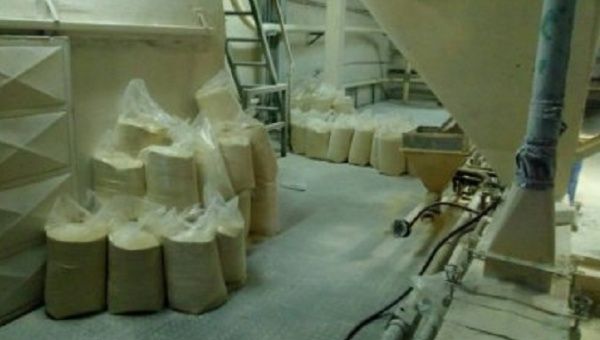Venezuelan Company Lets 55 Tons of Flour Rot
LATIN AMERICA AND THE CARIBBEAN, 27 Nov 2017
teleSUR – TRANSCEND Media Service
The company received more than US$85 million in government subsidies in 2015 for the production and distribution of food at fair prices.

Bags of corn flour left to rot seen inside Demaseca’s company plant in Venezuela.
| Photo: Alba Movimientos
21 Nov 2017 – The Productive Workers Union in Venezuela exposed that 55 tons, or 50,000 kilograms, of corn flour were left to rot by the company Demaseca as part of a boycott to damage the country’s economy.
The workers said that the product was left in six of the 12 plants owned by the company in La Miel, in the municipality Simon Planas of the state of Lara. They said the move was based on a decision made by the owners of the company who left the corn flour to rot.
RELATED: Venezuelan Food Company Caught Burying Alive Millions of Chicks
The workers allege that in the current state, where it is no longer suitable for human consumption, the material is sold as an ingredient to feed cows and pigs.
Due to its lack of regulation, this will increase the profit of the Mexican multinational Gruma, and the Venezuelan population will see shortages in stores, said the workers.
Demaseca, part of the Venezuelan company Monaca, became part of the Mexican company Gruma in 1999.
httpv://www.youtube.com/watch?v=7xxAnleNthE
The company received more than US$85 million in government subsidies in 2015 for the production and distribution of food at fair prices.
In addition, the workers said that this is not the first time this situation has happened, and it’s not the first company to be involved in such practices, demanding stronger measures against this multinational company.
A commission of the National Superintendence of Agrifood Management later reported that only 7,000 kilograms of the flour was in poor condition, according to a report.
Go to Original – telesurtv.net
DISCLAIMER: The statements, views and opinions expressed in pieces republished here are solely those of the authors and do not necessarily represent those of TMS. In accordance with title 17 U.S.C. section 107, this material is distributed without profit to those who have expressed a prior interest in receiving the included information for research and educational purposes. TMS has no affiliation whatsoever with the originator of this article nor is TMS endorsed or sponsored by the originator. “GO TO ORIGINAL” links are provided as a convenience to our readers and allow for verification of authenticity. However, as originating pages are often updated by their originating host sites, the versions posted may not match the versions our readers view when clicking the “GO TO ORIGINAL” links. This site contains copyrighted material the use of which has not always been specifically authorized by the copyright owner. We are making such material available in our efforts to advance understanding of environmental, political, human rights, economic, democracy, scientific, and social justice issues, etc. We believe this constitutes a ‘fair use’ of any such copyrighted material as provided for in section 107 of the US Copyright Law. In accordance with Title 17 U.S.C. Section 107, the material on this site is distributed without profit to those who have expressed a prior interest in receiving the included information for research and educational purposes. For more information go to: http://www.law.cornell.edu/uscode/17/107.shtml. If you wish to use copyrighted material from this site for purposes of your own that go beyond ‘fair use’, you must obtain permission from the copyright owner.
Read more
Click here to go to the current weekly digest or pick another article:
LATIN AMERICA AND THE CARIBBEAN: